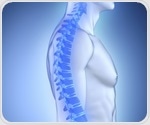| |  A 13-year study led by the Colorado School of Public Health at the University of Colorado Anschutz reveals why a deadly parasitic infection targeted for elimination in China persisted in some areas even after decades of control. A 13-year study led by the Colorado School of Public Health at the University of Colorado Anschutz reveals why a deadly parasitic infection targeted for elimination in China persisted in some areas even after decades of control. | |
|
| |  Researchers at the University of São Paulo (USP) in Brazil have discovered that two osteoporosis drugs (etidronate and tiludronate) may combat diseases caused by iron accumulation in the body. Researchers at the University of São Paulo (USP) in Brazil have discovered that two osteoporosis drugs (etidronate and tiludronate) may combat diseases caused by iron accumulation in the body. | |
|
| |  A protein’s life is anything but simple. Discover how transcription, translation, folding, modification, and degradation work together to preserve proteome integrity. A protein’s life is anything but simple. Discover how transcription, translation, folding, modification, and degradation work together to preserve proteome integrity. | |
|
| |  Researchers at the MRC Laboratory of Medical Sciences (LMS) and Imperial College London have shown for the first time that, before they can start developing into egg and sperm cells, the embryonic precursors of these cells uniquely reshape the 3D organization of their genetic material. Researchers at the MRC Laboratory of Medical Sciences (LMS) and Imperial College London have shown for the first time that, before they can start developing into egg and sperm cells, the embryonic precursors of these cells uniquely reshape the 3D organization of their genetic material. | |
|
| | Researchers at the MRC Laboratory of Medical Sciences (LMS) and Imperial College London have shown for the first time that, before they can start developing into egg and sperm cells, the embryonic precursors of these cells uniquely reshape the 3D organization of their genetic material. | |
|
| | Over the years, cell biology has built a detailed picture of how cells compartmentalize their internal functions. Central to this organization is the nucleus, which houses the genetic material and is separated from the cytoplasm by a robust nuclear envelope. | |
|
| | Food insecurity can increase anxiety and undermine employees at work, but workplace programs to address it can improve job outcomes, according to research published by the American Psychological Association. | |